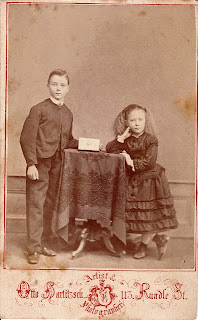
The masculine and feminine.
A two-hour survey of evening activities:
1. the newscasts ("HHS Saves Women's Health!" "Same-Sex Marriage Approved in ______!"),
2. channel-surfing (have you seen "How I Met Your Mother"? "The Bachelor"? even "The Voice"),
3. and even giving up and going for a walk (bumper sticker: "Abortion is Healthcare. Healthcare is Good.").
The overwhelming message is this: the categories "masculine" and "feminine" no longer need apply. They are inessential, simply describing certain behaviors of either sex that remind us of the fact that, "Oh! Men and women used to be different."
See? Dumb, fun-loving men. Responsible, calm, in-charge women.
We've come so far.
A friend recently shared a paper on the loss of the feminine in post-Nietzschean societies. His ideas (the friend's) bear much more in-depth treatment, but for the moment I was struck by a few passages from Nietzsche's Beyond Good and Evil.
Now, Nietzsche was no modern feminist: he believed that in order to escape the Judeo-Christian slave morality, women must once more be seen solely as the bearers of offspring--a role entirely unmasculine, but also entirely isolated from the masculine. The man must dominate the woman in order to use her as a woman.
But he had a unique insight into the tragedy of modern women: "[The modern woman defeminizes herself] so as to imitate all the stupidities from which ... European manliness suffers." (BGE, 239)
How. True.
Let's think of all the popular female complaints about men.
1. They are so stupid (see commercial), that they think they still run the world.
2. All they want is sex (see sitcoms).
3. They never think about children.
4. They fear commitment.
5. They are either hairy and unsanitary or uber-clean metro-sexuals (laser hair removal!).
6. If they're nice, they're gay. (How many times have you heard that line?)
Now let's think of the popular image of independent modern women.
1. They are so smart and accomplished that they dominate everything they attempt--and so well, too, that the stupid men don't know who's really in charge.
3. They never think about children (see #2).
4. They seek out long-term commitments to anyone but the men in their lives.
5. They are either unsanitary and dressed for bed or sanitary and dressed to kill. They are always hairless.
6. They are really nice and friendly to everyone who agrees with them.
Now, this is harsh. And these are stereotypes. But take a close look: the stereotypical view of men is in strange parallel to the image held up for women.
Masculine: stupid aggressor.
Feminine: smart aggressor.
Together: it's war.
But is there any alternative? Nietzsche solves the problem with a classic domination scheme: If men were more classically masculine and women were more classically feminine, then the war would be won. By men. Domination-subordination.
This could be what the secular feminists rage against. They think they're raging against the Church. They're actually raging against the Father of Nihilism.
There is another way: John Paul II in
Mulieris Dignitatem suggests that, because the male-female differences are a way in which the human person--the communion of human persons--is the image of God, they are not originally at war.
The man and woman can exist, not only together, but also "mutually 'one for the other.' (MD, 7)
Masculine:
1. creating
2. proclaiming
3. saving
4. striving
Feminine:
1. gestating (spiritually and biologically!)
2. listening
3. praising
4. waiting.
The Church notes--in a redeemed echo of the "stupid man" commercials--that every Christian must in a sense become feminine. We are all listening to the Word, gestating the Word in our hearts, praising the Word, and waiting for the Word to come to us.
The honor due to the truly feminine.
Nietzsche knew women had lost something in the modern era. He just had no idea how tragic that loss was. Or how glorious would be its recovery.
 These are the last words we heard from St. Teresa Benedicta of the Cross (Edith Stein)--spoken, or perhaps written, from a cattle car near Breslau. She asked a brakeman to send them to her sisters in Carmel. The words chill the flesh: We know now her destination was the gas chambers of Auschwitz.
These are the last words we heard from St. Teresa Benedicta of the Cross (Edith Stein)--spoken, or perhaps written, from a cattle car near Breslau. She asked a brakeman to send them to her sisters in Carmel. The words chill the flesh: We know now her destination was the gas chambers of Auschwitz. 







